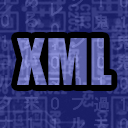XML:OFGA
Jump to navigation
Jump to search
| OFGA : Object Furniture Geometry Array | 
| |
|---|---|---|
| XML
OBAN << Other file types >> ONCC |
general information
- The xml code on this page is compatible with onisplit v0.9.61.0 and v0.9.68.0
- OFGA are level specific.
- OFGA files were rarely used in game, only to get the bounding box of the geometry.
- Nowadays they are used to import objects with no functions. (Doors, consoles, etc. becomes imported by their object collections. See ONLV for more information.)
file structure
There's space only for one particle but multiple OFGA elements.
|
extracted OFGAV_tctf_cruiser.xml file led to the 8 M3GM instances the single parts were then imported into Mod Tool |
<?xml version="1.0" encoding="utf-8"?>
<Oni>
<OFGA id="0">
<EnvParticle></EnvParticle>
<Elements>
<OFGAElement>
<GunkFlags>NoCharacterCollision NoOcclusion</GunkFlags>
<Geometry>M3GMV_tctf_cruiser_0</Geometry>
</OFGAElement>
<OFGAElement>
<GunkFlags>NoCharacterCollision NoOcclusion</GunkFlags>
<Geometry>M3GMV_tctf_cruiser_1</Geometry>
</OFGAElement>
<OFGAElement>
<GunkFlags>NoCharacterCollision NoOcclusion</GunkFlags>
<Geometry>M3GMV_tctf_cruiser_2</Geometry>
</OFGAElement>
<OFGAElement>
<GunkFlags>NoCharacterCollision NoOcclusion</GunkFlags>
<Geometry>M3GMV_tctf_cruiser_3</Geometry>
</OFGAElement>
<OFGAElement>
<GunkFlags>NoCharacterCollision NoOcclusion</GunkFlags>
<Geometry>M3GMV_tctf_cruiser_4</Geometry>
</OFGAElement>
<OFGAElement>
<GunkFlags>NoCharacterCollision NoOcclusion</GunkFlags>
<Geometry>M3GMV_tctf_cruiser_5</Geometry>
</OFGAElement>
<OFGAElement>
<GunkFlags>NoCharacterCollision NoOcclusion</GunkFlags>
<Geometry>M3GMV_tctf_cruiser_6</Geometry>
</OFGAElement>
<OFGAElement>
<GunkFlags>Invisible NoObjectCollision</GunkFlags>
<Geometry>M3GMV_tctf_cruiser_7</Geometry>
</OFGAElement>
</Elements>
</OFGA>
</Oni>
tags
| XML tag | content type | description |
|---|---|---|
| <EnvParticle> | ? | if used, the name is equal to ONLV => ENVP => <Tag>...</Tag> ? |
| <Elements> | - | You can put here quite any number of <OFGAElement> tags. The array is an int32. |
| <OFGAElement> | - | |
| <GunkFlags> | flag |
|
| <Geometry> | link | M3GMfile_name.oni (without file suffix .oni) |
export
The direct export ignores geometry with the flag "Invisible".
onisplit -extract:obj out in/OFGA*.oni
You can also identify the single geometry parts by going through the xml file and then export the M3GM file of your interest.
onisplit -extract:xml out in/OFGA*.oni onisplit -extract:obj out in/M3GM*.oni
